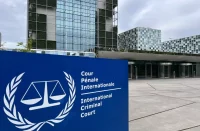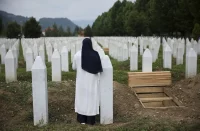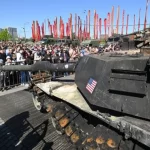A feature common to the serial outbreaks of unrest in the course of the Arab Spring and the conflicts in the post-Yugoslavian space was the involvement of the armed opposition which had grown out of local criminal or downright terrorist groups in the resulting transitions. The Arab countries which ended up on the US hit list over the past years – Tunisia, Egypt, Yemen, Libya, and, at the moment, Syria – came under the neocolonial pressure from Washington for their stable statehoods and tendency to handle natural resources independently. The coups aimed at wrestling control over the resources from the respective governments employed NATO as the main force with local groups, mostly those of politicized Islam, contributing crucial assistance. The US, Qatar, and the European trio comprising Germany, Great Britain, and France armed and nourished financially the Muslim fundamentalists in Libya. The US, the trio, and Turkey, backed by the league of Arab princes, gave money to the Muslim Brotherhood in Syria, the country where the group used to be banned. The new and de facto occupational regimes which pop up on the ruins of the bulldozed statehoods and readily pass the respective nations’ key assets to transnational companies typically agree to a ridiculously narrow political autonomy of the nations under their control.
In the Balkan region, the occupation of a part of the Serbian territory and its political separation from the original country during the 1999 NATO aggression led to the now maturing Kosovo independence. When the conflict over the province was brewing, the opposition in it was armed and already acted as a group with a subversive and terrorist agenda. In 1999, the US Republican Political Committee issued a report titled “The Kosovo Liberation Army: Does Clinton Policy Support Group with Terror, Drug Ties? From ‘Terrorists’ to ‘Partners’”. The document contained a description of one of the first offensives launched by the Kosovo Liberation Army – a series of 1996 attacks on Serbian refugee camps in Croatia and Bosnia. According to the document, KLA officers were supposed to receive US training with an eye to transforming the group into a political force.
In July, 2008, Serbia’s Kurir shed light on a secret resolution passed in Brussels on March 13, 1999 by the NATO top brass. It combined the finalized decision to bomb Yugoslavia with a plan for the creation of an independent Kosovo which would function with the NATO backing and would eventually merge into a Greater Albania, drawing along Serbia’s southern part up to Aleksinc, the west of Macedonia, Montenegro’s Malësi, and a chunk of northern Greece. The projected mission of that Greater Albania was to dominate the Balkans as a region and the entire transit web linking it to Asia and Africa.
The Pristina regime whose record opened with a campaign of terror against the civilian population was quick to acquire, with NATO’s help, a serious military component: when the armed phase of the conflict with Belgrade was over, the KLA did not put down arms but re-entered the scene in the guise of the Kosovo Protection Corps which was renamed to the Kosovo Security Force in 2009 and to the Kosovo Army by the end of 2011. The criminal groups involved continued to exist side by side with NATO, various Western missions, and countless NGOs in Kosovo as the captioning game played out.
In December, 2010 Swiss prosecutor and Council of Europe rapporteur Dick Marty confronted the world audiences with the Balkans’ open secret – his sensational report detailed the region’s sweeping organized crime and, particularly, the illicit human organs trafficking in which the Kosovo administration and KLA top commanders were heavily implicated. Somebody Rexep, an Albanian from the KLA, says that in Kosovo everything in and around the illegal business is in the hands of the administration and that – for fear of death – nobody has any chance to run drug or human trafficking or anything like that without the regime’s blessing.
Dick Marty’s report showed that the KLA headed by Kosovo present-day premier Hashim Thaci (a notorious butcher nicknamed the Snake) kidnapped Serb residents in the province and the Albanians suspected of collaborating with Belgrade, to traffic them to the north of Albania, where the people were killed and their organs carved out for sale on the black market. The UN, NATO, and OSCE, as well as the majority of the Western governments, pretended to be unaware of what was going on. K-144, a protected witness of the International Criminal Tribunal for the former Yugoslavia, claims that 4 million Deutsch marks landed in Thaci’s pockets as proceeds from dealing organs extracted from slain Serbs.
Bernard Kouchner was the first Head of the United Nations Interim Administration Mission in Kosovo (UNMIK). Oddly enough, the Médecins Sans Frontières group of which he was co-founder smuggled weapons when the conflict was raging in the post-Yugoslavian space and was caught red-handed at 43 checkpoints in Bosnia, 25 – in Croatia, and 14 – in Kosovo. The withdrawal of the Serbian police from Kosovo enabled Thaci’s gangsters to kidnap people in the province with no risk of meeting with resistance. Some sources are convinced that the kidnapped were placed and subjected to illicit extractions in the NATO bases. Indeed, 6 – 14 aircrafts took off at Camp Bondsteel NATO base in Kosovo daily, and suspicions multiply that the flights could be used to deliver human organs to recipients in West Europe, mostly in Great Britain.
On January 7, 2011, 50 British surgeons voiced a call for the legalization of human organs trade, citing the steady increase in demand and the freedom of choice for those eager to be donors due to financial regards. No doubt, human organs trafficking has a potential to become a source of criminal enrichment on pars with the drug business. Der Spiegel argues that, in the global distribution of roles in the market of illicit transplantations, most of the buyers are found in the US, Canada, Israel, and Saudi Arabia while most of the donors – in China, India, the Philippines, Egypt, and Moldova. The independent Kosovo, a territory with a reputation of horror land, acts as a major trafficking hub in the framework.
Investigating the nightmare pictured in Marty’s report is supposed to be the responsibility of EULEX. The mission currently oversees two probes in Pristina: prosecutor Clint Williamson looks into the 1998-199 story around the Yellow House near Burrel in central Albania, and prosecutor Jonathan Ratel – into the Medicus clinic case. Initially, in November, 2008, the latter case was opened by the Kosovo police and its UNMIK colleagues, but later EULEX took over. The probe is still incomplete, but, shockingly, it seems clear at this point that only 9 people are to face charges, the key figures in the number being Pristina University professor of medicine Lutfi Dervishi, Medicus founder Ilir Recaj, Turkish surgeon Yusuf Sonmez, and an Israeli named Moshe Harel. The Medicus inquiry is at least conducted in an open mode, while the Yellow House drama is being dealt with under wraps for the stated reason that the investigators must be kept safe on site. The real parallel between the two cases, however, is that both are stalling: Williamson, for example, says no completion should be expected within the next couple of years. Importantly in the context, EULEX rejects any form of cooperation with Serbia’s law-enforcement agencies and maintains that internationalizing the case is off the table. Even if the Medicus case unravels to some sort of a final point, it will continue to revolve around the tiny clinic, with the Kosovo administration and its influential international patrons unaffected.
The inescapable conclusion stemming from the pertinent materials is that the heinous crimes can be traced to the uppermost administration levels in Pristina. The office of Serbia’s war crimes prosecutor says the KLA command posts were sited in the Prifc and Tropojë villages. Tropojë, the place to which mujahideen flocked from across the world, was where the KLA headquarters functioned. For a reason that invites guesswork, the Haradinaj brothers – Nasim, Shkelzën, Daut, and Ramush – are known to have frequented the village hospital. Tropojë, Kukës, and Bajram Curri served as the training bases, the latter also hosting wounded KLA guerillas at a medical centre. Captive Serbs, Roma, and Albanians “guilty” of disloyalty were held in hangars near the abandoned barracks and firing ranges. An illicit detention facility was set up at the Deva deserted mine, with tunnel outlets on both sides of the border, and used to torture the captives or to extract organs from the healthier of them. The Viçidol village is located not far from Tropojë – in April, 1998, it was visited by the entire KLA command which stayed at a house owned by the family of Albanian premier Sali Berisha. The reception was coordinated by Suleiman Berisha, the brother of the premier’s uncle and the man who kept in touch with the Kosovo envoy to Tirana. The village was the start of a route massively supplying arms to Kosovo (to the Junik and Borovina villages in the proximity of Decani), and, moreover, members of the Berisha family tentatively were a part of the hierarchy in a criminal group which kidnapped people to extract their organs for sale in West Europe where a heart or a kidney can cost as much as Euro 120,000. A big camp where up to 200 guerillas per shift were trained existed right in Tirana and was equipped with a hospital. Funds were poured into the KLA internationally, mostly from Switzerland, via the Tirana-based Dardania Bank.
A scandal erupted in 2012 when Der Spiegel released facts concerning the Kosovo administration’s involvement in human organs trafficking, a partnership between the Kosovo criminals and several German citizens, and the organs supply from Medicus to medical institutions in Berlin, Göttingen, and Regensburg. The organs went illicitly to recipients who paid large sums of money and received treatment ahead of other patients. Reportedly, Vera, an immigrant from Russia, sold her kidney for Euro 8,000, and it was bought by Walter, a German industrialist, for Euro 81,000. Medicus was, in reality, owned by Manfred Ernst Beer, an urologist from Berlin with business ties to the registered owner Lufti Dervishi, whose family suggested opening a clinic in Kosovo. EULEX would not comment on the hypothesis that Medicus was an element of a wide international network of illicit transplantology. It came as a vivid illustration of the proportions of the phenomenon that Carla Del Ponte quoted a Middle Eastern intelligence service in her “The Hunt: Me and War Criminals” as asserting that a sheik said he regretted that he had been given a Serbian heart but was glad to be alive. Up to date, the abundance of implicating materials does not appear to translate into any progress in the probe. The stalemate is in part owed to the International Criminal Tribunal for the former Yugoslavia where, unbelievably, the whole bulk of evidence pertinent to the Yellow House case opened in January, 2005 was destroyed in 2006, with no indictments produced. Evidently, the investigation spotlight reached figures too important to be disturbed.
The KLA commanders turned independent Kosovo’s leaders are confident of their immunity to prosecution and are not going to tone down their criminal activities. In a conversation which took place shortly after the assassination of Serbian premier Zoran Đinđić, Hashim Thaci and Agim Çeku discussed plans for exporting illicit money to Serbia, buying into the country’s investment funds, and thus grabbing enterprises and land lots across it. Thaci said Pristina’s agents should start companies in London or – even better, as he remarked – in Russia, take part in the privatization in Serbia, buy lands, food-processing factories, and real estate in major cities within a money-laundering campaign. He also suggested partnering the Croats who already got plenty of land in Vojvodina cheap.
* * *
The Euro-Atlantic blueprint for the future of South East Europe gives a big role to the criminal enclave called the Republic of Kosovo. It is to become a base of world-level organized crime, and that is already happening. Drug supply to Europe, illicit organs extraction and trafficking, campaigns of terror against the resident populations and ethnic cleansing are hallmarks of the Kosovo independence which sends criminal metastases all over Europe while it stays under a delusion that its civilization standards are intact…
The KLA was instrumental in NATO’s game aimed at undermining Yugoslavia. Now that the federation is gone, Serbia is nevertheless the top regional power which can, moreover, anytime boost its potential by truly engaging with Russia. Clearly, the KLA will be preserved and cultivated as a counterforce. It has full political control over Kosovo, including the predominantly Serbian north of the province, is heavily armed and well-funded, and enjoys permanent support from Washington. With the Pristina administration enthroned, Kosovo is a territory of chaos dominated by criminal groups thinly disguised to look like credible officialdom. While the probes into the organized crime in Kosovo remain an imitation of justice, the problem is spilling worldwide.
Source: Strategic Culture Foundation














Comments